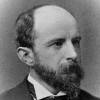“ In treating of human substance, one is bound by human limitations. ”
Henry Adams, Mont-Saint-Michel and Chartres (1904). copy citation
| Author | Henry Adams |
|---|---|
| Source | Mont-Saint-Michel and Chartres |
| Topic | |
| Date | 1904 |
| Language | English |
| Reference | |
| Note | |
| Weblink | http://www.gutenberg.org/cache/epub/4584/pg4584-images.html |
Context
“and humanity being, like other essences or substances, indivisible, passes wholly into each individual, becoming Socrates, Plato, and Aristotle, much as the divine substance exists wholly and undivided in each member of the Trinity.
Here Abelard interrupts. The divine substance, he says, operates by laws of its own, and cannot be used for comparison. In treating of human substance, one is bound by human limitations. If the whole of humanity is in Socrates, it is wholly absorbed by Socrates, and cannot be at the same time in Plato, or elsewhere. Following his favourite reductio ad absurdum, Abelard turns the idea round, and infers from it that, since Socrates carries all humanity in him, he carries Plato, too;”
source



